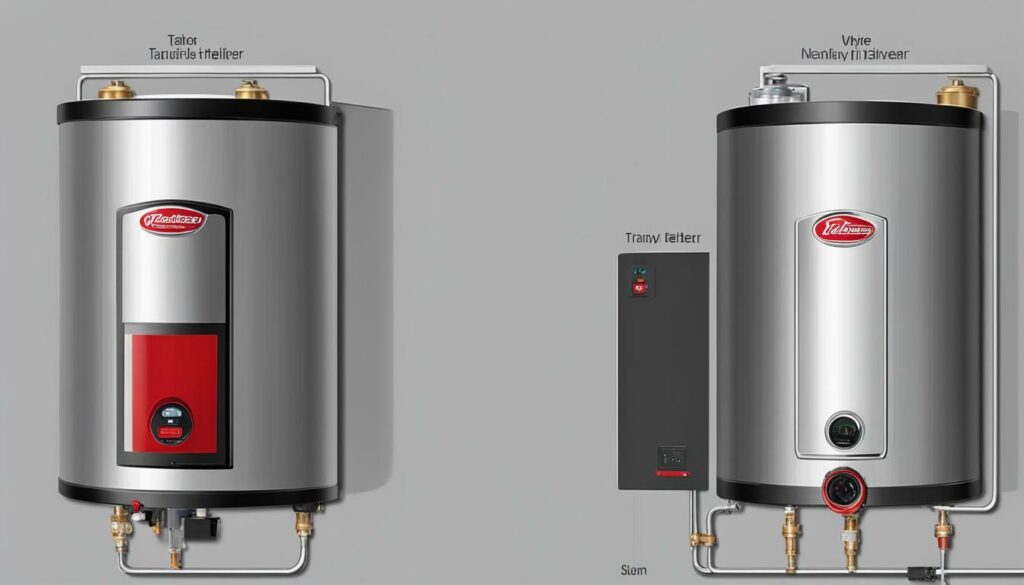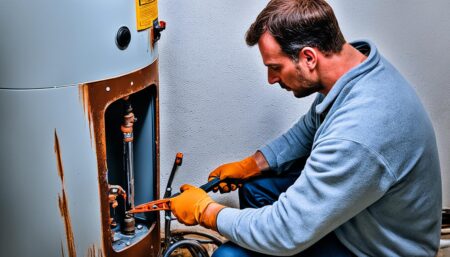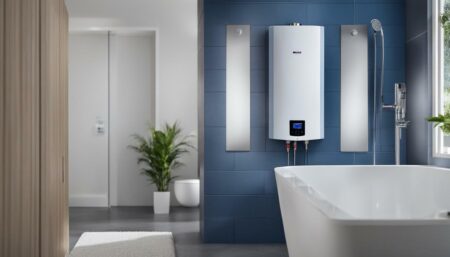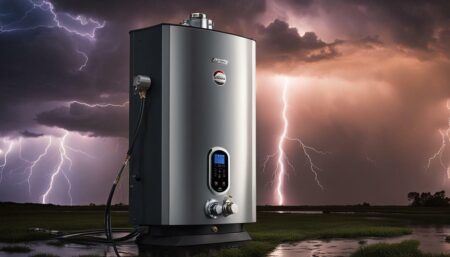When it comes to choosing a water heating system for your home, it can be challenging to decide between an electric tankless water heater and a traditional tank water heater. Both systems have their advantages and disadvantages, and it’s essential to understand how they differ to make an informed decision.
In this comprehensive guide, we will compare electric tankless water heaters with traditional tank water heaters. We will look at their efficiency, cost, space-saving benefits, durability, and other factors to help you determine which option is best for your needs.
- Electric tankless water heaters and traditional tank water heaters offer different benefits and drawbacks.
- Efficiency, cost, space-saving benefits, durability, and hot water demand are essential factors to consider when choosing between the two systems.
- Electric tankless water heaters are gaining popularity among homeowners for their energy efficiency, compact size, and flexible installation options.
- Traditional tank water heaters remain a popular choice for their affordability and ease of installation.
- Making an informed decision requires evaluating your specific needs and preferences.
Understanding Electric Tankless Water Heaters
Electric tankless water heaters are innovative and energy-efficient appliances designed to heat water instantaneously without the use of a storage tank. Instead of keeping a large volume of water hot continuously, electric tankless water heaters heat water on demand as it flows through the unit’s heating coils.
One of the significant benefits of electric tankless water heaters is the ability to reduce energy consumption by up to 50%. Unlike traditional tank water heaters, electric tankless models heat water only when needed, minimizing standby energy loss. Additionally, electric tankless water heaters have an extended lifespan, often lasting more than 20 years, which can help save money on replacement costs in the long run.
Another benefit of electric tankless water heaters is their compact size, making them ideal for homes with limited space. Unlike large traditional tanks, electric tankless models can be installed in small closets or mounted on walls.
Overall, electric tankless water heaters are a reliable, energy-efficient, and space-saving option for homeowners. By upgrading to an electric tankless water heater, you can enjoy instant hot water, lower energy bills, and a longer lifespan for your appliance.
Exploring Traditional Tank Water Heaters
Traditional tank water heaters are the most commonly used and well-known type of water heater. They store hot water in a large tank, which is constantly heated and maintained at a specific temperature. This ensures that hot water is readily available whenever required.
One of the biggest advantages of traditional tank water heaters is their affordability. They are relatively inexpensive to purchase and install, making them a popular choice for many homeowners. Additionally, they are often easier to repair and maintain compared to electric tankless water heaters, making them a more convenient option for those who prefer a straightforward and simple system.
Another benefit of traditional tank water heaters is their long lifespan. With proper maintenance and regular servicing, they can last up to 15 years or more, which is a considerably long time compared to electric tankless water heaters.
However, traditional tank water heaters do have some drawbacks. One of the main downsides is their larger size, which requires a considerable amount of space for installation. They can also be less energy-efficient, as they continuously heat water even when it is not in use, resulting in higher energy bills. Additionally, they can run out of hot water if demand exceeds the capacity of the tank.
Overall, traditional tank water heaters offer a reliable and cost-effective solution for homeowners who do not have high hot water demand and have ample space for installation. Their long lifespan and simple maintenance make them a low-maintenance option for those looking for a traditional water heating system.
When it comes to efficiency, electric tankless water heaters have a significant advantage over traditional tank water heaters. This is because electric tankless water heaters only heat water when it is needed, eliminating standby heat loss that occurs in traditional tanks.
The energy efficiency rating of electric tankless water heaters is also higher than traditional tanks, with some models boasting a rating of up to 99%. This means that nearly all of the energy used is converted into heat, making it a much more efficient option in the long run.
In contrast, traditional tank water heaters are less efficient because they constantly heat and store water, even when it is not needed. This requires more energy and can lead to higher utility bills.
It’s also worth noting that electric tankless water heaters have a longer lifespan than traditional tanks, reducing the need for frequent replacements and further contributing to their efficiency.
Electric Tankless vs Traditional Tank Efficiency Comparison Table
| Factor | Electric Tankless Water Heater | Traditional Tank Water Heater |
|---|---|---|
| Energy Efficiency Rating | Up to 99% | Up to 80% |
| Standby Heat Loss | Eliminated | Presents |
| Lifespan | Over 20 years | 8-12 years |
Overall, if energy efficiency is a priority for you, an electric tankless water heater is the way to go. While it may have a higher initial cost, the energy savings in the long run make it a worthwhile investment.
Cost Consideration: Electric Tankless vs Traditional Tank
When it comes to making a decision between an electric tankless water heater and a traditional tank water heater, cost is a crucial factor to consider. The initial purchase price, installation costs, and long-term savings associated with each option can vary significantly.
Electric tankless water heaters are generally more expensive upfront than traditional tank water heaters. However, their energy-efficient design can lead to significant savings over time, as they only use energy when hot water is needed. Additionally, electric tankless models have a longer lifespan than traditional tank water heaters, potentially saving you from frequent replacements and maintenance costs.
The installation of electric tankless water heaters can also be less costly than traditional tank water heaters. These units are compact in size and do not require a storage tank, saving space and simplifying installation. On the other hand, traditional tank water heaters require more installation space and additional venting, which can add to the installation costs.
It is important to note that the cost of electricity varies by location, and the cost savings associated with electric tankless water heaters may vary accordingly. Be sure to research your local energy rates to get a better understanding of the potential long-term savings of an electric tankless water heater.
Overall, while electric tankless water heaters may have a higher initial cost, they can offer long-term savings, greater energy efficiency, and a longer lifespan. Traditional tank water heaters may be cheaper upfront, but their installation and maintenance costs should also be taken into account. It ultimately depends on your specific needs and budget to determine which option is best for you.
Space Saving Benefits: Electric Tankless vs Traditional Tank
One of the most significant advantages of electric tankless water heaters over traditional tank water heaters is their space-saving design. Traditional tank water heaters are large and bulky, often taking up valuable floor space in a home. In contrast, electric tankless water heaters are compact and can be installed in a variety of locations, including under cabinets, in closets, or on walls. This makes them an ideal option for homeowners with limited space.
Furthermore, while traditional tank water heaters require a dedicated space for installation, electric tankless water heaters can be mounted on a wall, saving even more floor space. This flexibility in installation allows homeowners to optimize their living space while still enjoying the benefits of hot water on demand.
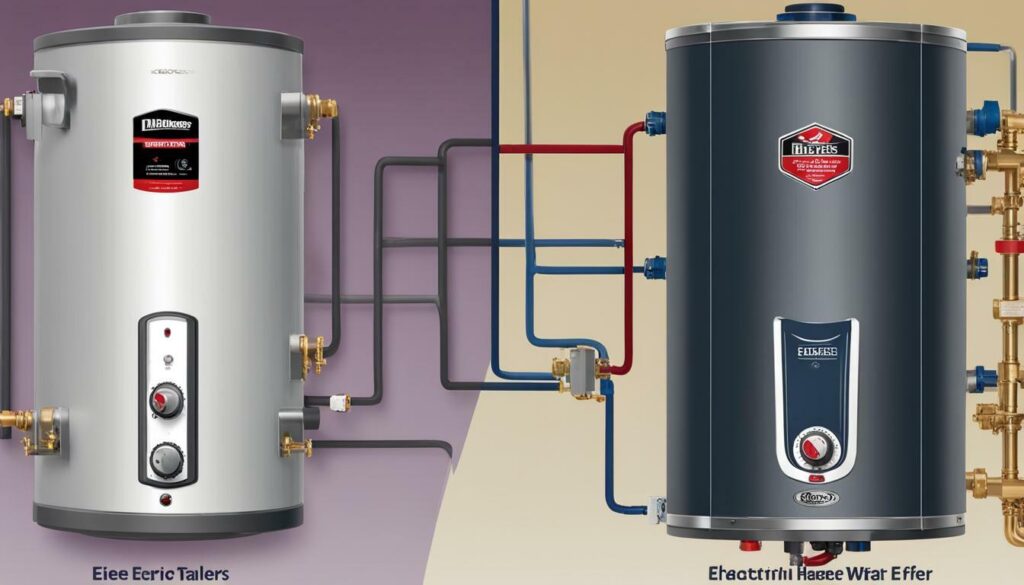
Another important advantage of electric tankless water heaters is their ability to provide hot water without the need for a storage tank. Traditional tank water heater tanks can hold anywhere from 30 to 80 gallons of water, adding to their overall size and space requirements. With an electric tankless water heater, there is no need for a storage tank, freeing up even more space in the home.
Ultimately, the space-saving benefits of electric tankless water heaters make them an excellent option for homeowners who live in smaller homes or apartments. With their compact size and flexible installation options, they offer a convenient way to enjoy hot water on demand without sacrificing valuable living space.
Lifespan and Durability: Electric Tankless vs Traditional Tank
When it comes to lifespan and durability, electric tankless water heaters and traditional tank water heaters follow different trajectories. While traditional tanks can last anywhere from 8 to 12 years, electric tankless water heaters can last up to 20 years or even more. This is because electric tankless water heaters have fewer mechanical components that can malfunction over time, unlike traditional tanks, which can develop leaks or rust.
However, it’s important to note that electric tankless water heaters require regular maintenance to ensure they last long. Hard water, for example, can cause mineral buildup on the heating elements, interfering with the unit’s performance. Nonetheless, regular maintenance can help prolong the lifespan of tankless water heaters.
Unlike electric tankless water heaters, traditional tank water heaters require periodic flushing to prevent sediment buildup, which can cause corrosion and reduce the unit’s lifespan.
Another factor to consider is the type of warranty offered by the water heater manufacturer. Electric tankless water heaters generally come with a longer warranty period due to their longer lifespan.
Overall, if you’re looking for a water heater that will last a long time and require less maintenance, an electric tankless water heater may be the better option. However, regular maintenance is necessary to ensure optimal performance and longevity.
Factors to Consider: Pros and Cons
When deciding between an electric tankless water heater and a traditional tank water heater, it’s vital to consider the pros and cons of each option. Both systems have their unique features and drawbacks, so understanding them can help you make an informed decision.
Pros
Firstly, let’s look at the potential benefits of choosing an electric tankless water heater:
| Pros | Explanation |
|---|---|
| Energy Efficiency | Electric tankless water heaters are highly efficient as they only heat water on demand, saving up to 30% on energy costs compared to traditional tanks. |
| Space-saving | Electric tankless water heaters are compact and take up less space than traditional tanks, allowing for more installation options. |
| Lifespan | Electric tankless water heaters can last up to 20 years, which is much longer than traditional tanks. |
By choosing an electric tankless water heater, you can enjoy energy savings, space-saving benefits, and an extended lifespan.
Cons
While electric tankless water heaters offer several benefits, they also have some potential drawbacks to consider:
| Cons | Explanation |
|---|---|
| Higher upfront cost | Electric tankless water heaters are more expensive to purchase and install than traditional tanks, which may require additional wiring and electrical upgrades. |
| Installation complexity | Electric tankless water heaters require professional installation, and some models may have specific placement requirements. |
| Limitations on hot water demand | While electric tankless water heaters can supply hot water on demand, they have a limit to the amount of hot water they can produce at one time. This may not be sufficient for larger households with high hot water demand. |
It’s essential to consider the higher upfront cost, installation complexity, and limitations on hot water demand when deciding whether to choose an electric tankless water heater.
Overall, it’s essential to weigh the pros and cons of both options to determine which system best suits your needs and preferences.
Now that we have explored the details of electric tankless water heaters and traditional tank water heaters, it’s time to weigh the pros and cons of each option. Here are some key factors to consider:
| Electric Tankless Water Heaters | Traditional Tank Water Heaters |
|---|---|
| Pros: | Pros: |
|
|
| Cons: | Cons: |
|
|
When choosing between an electric tankless water heater and a traditional one, you must consider your specific needs and preferences. If energy efficiency, endless hot water, and a longer lifespan are priorities, an electric tankless water heater may be your choice. However, if upfront cost and ease of installation are key factors, a traditional tank water heater may be the better option.
Ultimately, the decision comes down to your hot water demand, budget, available space, and maintenance preferences. Be sure to research and consider all factors before making a final decision.
After analyzing the efficiency, cost, space, and lifespan factors of electric tankless and traditional tank water heaters, you are now equipped to decide which system is best suited for you.
If you are looking for a system that provides hot water on demand, takes up less space, and has a longer lifespan, then an electric tankless water heater may be the way to go. However, a traditional tank water heater could be a better option if you have a lower hot water demand and prioritize initial cost savings.
Ultimately, deciding between an electric tankless water heater and a traditional tank water heater depends on your preferences and needs. Take your time, evaluate your hot water consumption patterns, and choose the system that fits your lifestyle and budget.



